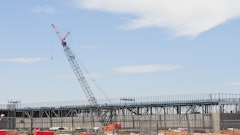
On November 14, the U.S. House of Representatives leadership appointed conferees to resolve the differences between recently passed House and Senate water resources development legislation (H.R. 3080)(S. 601).
House Passes Water Resources Reform and Development Act
House conferees include Republicans Bill Shuster (Pa.), John Duncan (Tenn.), Frank LoBiondo (N.J.), Sam Graves (Mo.), Shelley Moore Capito (W.Va.), Candice Miller (Mich.), Duncan Hunter (Calif.), Larry Bucshon (Ind.), Bob Gibbs (Ohio), Richard Hanna (N.Y.), Daniel Webster (Fla.), Tom Rice (S.C.), Markwayne Mullin (Okla.), Rodney Davis (Ill.), Doc Hastings (Wash.), and Rob Bishop (Utah).
Representing the Democrats are Nick Rahall (W.Va.), Peter DeFazio (Ore.), Corrine Brown (Fla.), Eddie Bernice Johnson (Texas), Tim Bishop (N.Y.), Donna Edwards (Md.), John Garamendi (Calif.), Janice Hahn (Calif.), Rick Nolan (Minn.), Lois Frankel (Fla.), Cheri Bustos (Ill.), and Grace Napolitano (Calif.).
Passage of Water Resources Development Act Praised for Bipartisanship
The Senate leadership nominated its conferees earlier this month. Representing the Senate are Democrats Barbara Boxer (Calif.), Max Baucus (Mont.), Tom Carper (Del.), Ben Cardin (Md.), and Sheldon Whitehouse (R.I.), and Republicans David Vitter (La.), John Barrasso (Wyo.) and James Inhofe (Okla.).
Several key differences must be addressed before final legislation can be delivered to President Obama for his signature. The Senate bill authorizes $12 billion for waterway construction and improvement over the next decade, $4 billion more than the House legislation. Additionally, the Senate gives the executive branch authority to determine which projects will be undertaken, while the House requires congressional review and approval. Critics have argued S. 601 cedes too much authority to the president, since the Army Corps of Engineers would approve projects in the future without congressional input.
Given the strong bipartisan support in both chambers, observers are optimistic these differences will be resolved quickly and a final conference report will be completed in the next few months.


























